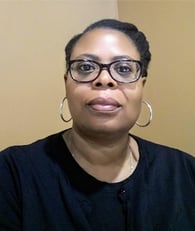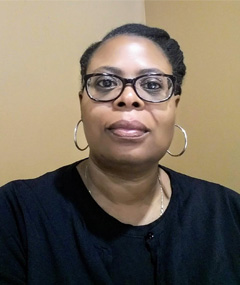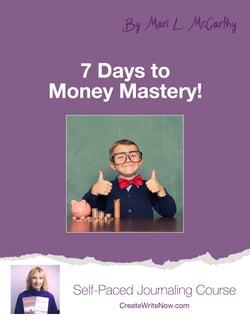Money makes me anxious, specifically excess money. After my bills are paid, any money left over causes me to feel uneasy because I'm not always sure what to do with it. I first started to experience this unsettling feeling when I became an adult living on my own and then as a mom of two children. Despite my awareness about money's ability to make me feel this way, it's a topic I've never seriously written about in my journal.
The Seven Days to Money Mastery course is designed to help you explore your relationship with money through the use of journal writing exercises. It also guides you in identifying financial goals and taking the necessary steps towards achieving them. The introductory pages of the course point out that "journaling is a powerful way to come to terms with and work through different kinds of stress in your life, and it is the perfect tool to manage your concerns about money." I decided to take the course because I know my feelings about money are potential blocks towards achieving the financial peace I desire in my life.
I also know my unresolved feelings are the reason why money remains a neglected topic in my journal. At the start of the course, I decided to confront this truth by reading some old journal entries looking for ones that specifically addressed the issue of money. I was only able to find a few random sentences that I'd written over the years.
Intellectually I've always known that my money issues were rooted in my family history, but I wasn't willing to address them on the blank page. History has taught me that the things I resist writing about are the exact things that I need to give my attention to. This course opened the door for the self-reflection and self-discovery that was missing in my journals.
The Seven Days to Money Mastery is structured with daily journaling assignments that are to be completed in a week. I took a little longer than the seven days recommended because I wanted more time to process some of the discoveries I was making. In particular, the exercises on day two were the ones that impacted me the most and led me to take a closer look at the connection between my childhood and my unresolved anxiety around money. Even as I progressed through the prompts, I found myself returning to the questions from the second day, re-reading my answers in an attempt to connect the dots.
One of the points illustrated in the course is the impact our families have on shaping what we think and feel about money. Participants are encouraged to examine their childhoods for clues that support the development of their financial attitudes, "your emotional responses to money, like your emotional responses to food, cleanliness, religion and most everything else in life, was first established because of experiences you had as a child."
When I began my examination, one thing I realized was that I wasn't able to recall many conversations about money with my parents.This realization led me to understand that I was influenced by what I saw in my home rather than by what I heard.
I grew up with two different money perspectives. My dad was the provider and the money he earned went to the basics such as food, shelter, and clothing. Watching him as a kid, I learned the value of hard work and making sure that your family's needs were always met. Providing for us was a responsibility my dad took seriously. He valued security, which was the foundation of his money beliefs.
My mom's attitude towards money was different. While my dad supported her decision to work, the financial health of the family was not dependent on the money she earned. Instead, her income was spent on the extras like shopping for home decorations, recreational activities or buying the type of snacks my dad didn't purchase during his weekly trips to the grocery store.
I believe my mom viewed money as something you weren't supposed to tightly hold on to but instead, it was to be spent and enjoyed.She looked at money from the perspective of abundance, believing that there would always be more. Whereas my dad saw it from the perspective of being responsible and prepared just in case some unfortunate event occurred like job loss or sickness.
Before taking this course, I'd never given any serious thought to the idea of reconciling these differences. But as I was writing my responses to the journal prompts, I began to make connections between my dad and myself. Either consciously or unconsciously, I adopted the provider role as an adult which conflicted with my mom's financial role in the family. I believe this conflict is at the root of the ongoing tension that exists between my need to be responsible and the desire to sometimes be free of that responsibility.
Despite not being able to recall many family conversations about money, as a kid I was aware of the differences that existed between my parents. The more I wrote about these differences, the deeper I began to think about the beliefs surrounding my spending habits and the uncomfortable feeling I experience when purchasing things that go beyond my basic needs. I started to wonder how I could blend my parents conflicting perspectives in a way that would be healthier for me.
Day four of the course was about identifying SMART goals for my financial life, something I'd already established and been diligently working on. Over the past three years, I’ve made significant gains in improving my financial health. My accomplishments were the result of following the recommendations of money experts such as eliminating credit card debt, establishing an emergency fund and creating a savings cushion.
Something that was suggested in the final day's exercises was to celebrate your financial wins, "bask in the satisfaction, self-confidence and pure joy of your victories to date (no matter how small)". Interestingly enough, I never saw my financial goals as something to celebrate. I just viewed them as the right thing to do, but I did take a moment to acknowledge my progress.
Another area for celebrating that I initially overlooked is the financial notebook that I’ve maintained for many years. This notebook is an important tool that I use weekly for tracking my bills, due dates, balances, and goals. It holds me accountable and has minimized some of the angst I feel when it's time to make payments or other decisions regarding money. Despite my past resistance to looking closer at my money issues, this notebook has been an important part of my journey and in achieving my goals.
Along with acknowledging and celebrating my small and large milestones; there is the realization that I still have some money blocks to overcome before I can reach my remaining financial goals. One of the many things I’ve learned as a result of this course is about the need to go beyond the mechanics of managing money and to spend more time thinking about its emotional impact.
Seven Days to Money Mastery recognizes the importance of intentionality in our relationships with money which is supported by a consistent journal writing practice.The author of the course, Mari L. McCarthy, writes, "continue to use your journal as a sounding board, friend and coach as you work towards your goals. You'll be amazed at how effectively you can master money challenges with the help of your journal."
In the days after completing the course I put into place some new practices. One of the practices includes creating space in my financial notebook to write about my thoughts and feelings. Some discoveries I hope to make in future journal writing sessions include learning how to further reduce the uneasiness I have with money. I want to grow in my ability to enjoy the pleasures in life that money allows one to experience without feeling like I'm doing something wrong, bad, or wasteful. And the biggest discovery I hope to find is the answer to the question, "how can I have a little bit more of my mom and a little less of my dad when it comes to my relationship with money?"

Author bio: Tara C Pray is the creator of The Journal Well Project, a site dedicated to the practice of journal writing and the weekly digital Journal Zine for those who love to journal.
NOW ON SALE!



Leave Comment